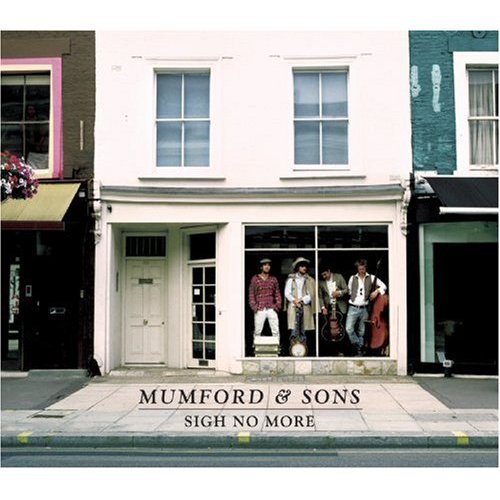
Mumford & Sons
Sigh No More
Release Date: Feb 16, 2010
Genre(s): Indie, Rock, Folk
Record label: Glass Note
Music Critic Score
How the Music Critic Score works
Album Review: Sigh No More by Mumford & Sons
Fairly Good, Based on 10 Critics
Based on rating 9.1/10
Nothing to be sorry for Sigh No More flutters to life with an apology. In an ethereal four-part harmony, the British foursome intones Benedict’s line to Beatrice from Much Ado About Nothing: “Serve God, love me and mend,” and then the voices swell in unison: “And I’m sorry.” It’s one of the only pastoral moments on the band’s hour-long debut LP, but the sentiment lingers. More than anything else, this much-hyped collection is an album chock full of gorgeous remorse—and it’s bursting at the seams.
Based on rating 8/10
Although you’d probably never guess it from listening to Mumford & Sons’ debut LP, Sigh No More, the entire band hails from West London. Yet these four gentlemen manage to tap into the fabled Old, Weird America better than their ballyhooed American counterparts Kings of Leon and the Avett Brothers. Beyond superficial measures like employing banjo, mandolin, and double-bass, Mumford & Sons appear to have a Masters‘ level education in and appreciation for American roots music traditions, not to mention that they can whip-up a barnstorming hoedown like it’s nobody’s business.
Based on rating 3/5
It is quite obviously a Good Thing that the centre of gravity of young British guitar music seems to be shifting. Where 18 months ago there was a new "landfill indie" album every other week, now it's new, young British folk-pop groups offering debut albums with metronomic regularity. Mumford & Sons spring from the same agglomeration of musicians that has already bequeathed us Laura Marling and Noah and the Whale, and are by all accounts a delightfully rowdy and passionate live band.
Based on rating 3/5
The British press was quick to question the authenticity of Mumford & Sons following the October UK release of Sigh No More. But divorced from the English "new folk" context, their debut just sounds like an earnest slice of polished roots folk. [rssbreak] Occasionally, an overwrought lyrical clunker betrays the band's youthfulness, but their willingness to dabble in myriad sub-genres and Marcus Mumford's plaintive croak make them sound like veteran folkies.
Based on rating 6/10
English folk outfit Mumford & Sons' full-length debut owes more than a cursory nod to bands like the Waterboys, the Pogues, and the Men They Couldn’t Hang. The group's heady blend of biblical imagery, pastoral introspection, and raucous, pub-soaked heartache may be earnest to a fault, but when the wildly imperfect Sigh No More is firing on all cylinders, as is the case with stand-out cuts like "The Cave," "Winter Winds," and "Little Lion Man," it’s hard not to get swept up in the rapture. Like their London underground folk scene contemporaries Noah & the Whale, Johnny Flynn, and Laura Marling, Mumford & Sons' take on British folk is far from traditional.
Based on rating 5/10
Let’s not bother with too much of an introduction or prelude to Mumford & Sons’ debut, Sigh No More, and instead cut directly to the fundamental problems with the record. It’s dull. It’s limp. It lacks character. It has more than a little of the try-hard about it. Despite this, much will be ….
Based on rating 2.1/10
That band name derives from singer/guitarist Marcus Mumford, but the band members aren't actually his sons. Rather, it's a play at quaint family businesses run by real people in real small towns, trades passed down through generations: both independent (yes, as in indie) and commercial. It's a shallow cry of authenticity, but this West London quartet really does sound more like a business than a band, supplying value-added products at discount prices.
Opinion: Very Good
A mostly winning debut that should see them go on to fine things indeed. Alex Denney 2009 London’s nu-folk scene has turfed up surprises as unlikely as they’ve been refreshing of late. First we had Laura Marling, displaying a poise and unnerving command of her material that called to mind the best of the 70s troubadour tradition. Then there was Johnny Flynn’s earthy erudition, steeped as it was in folk’s mystical lexicon.
Opinion: Very Good
The problem of authenticity in folk is as old as the Appalachians. Ever since masters of the form were plucked from under rocks and corralled into chic NYC café venues for the edification of right-on students in the early ’60s, folk has signalled something desirable yet tantalisingly out-of-reach for fed-up inhabitants of the lonesome, crowded west. [a]Mumford & Sons[/a] might sound like the name of a defunct timber supply yard you were sworn off playing around by your mum as a nipper, but in fact it’s the ongoing concern of four young fellows from London; a name that fixes the band in a long tradition of ramblin’, gamblin’ truth-tellers with guitars, and proudly announces authenticity shot through their spindly frames like sticks of rock.
Opinion: Very Good
JAHEIM “Another Round”. (Atlantic).

